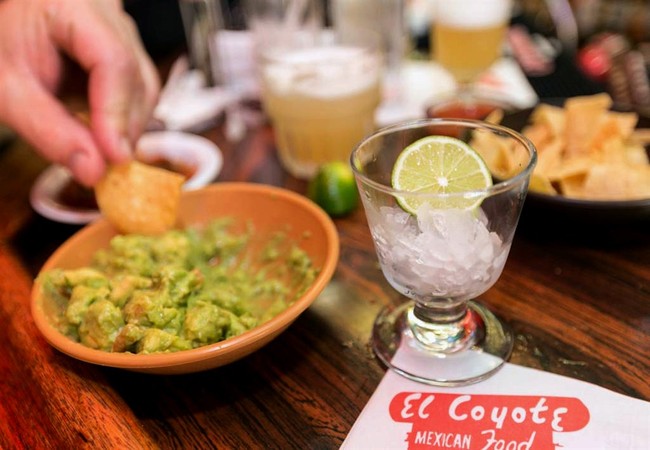
In the lead-up to this year’s presidential election and in the weeks since it’s been entertaining and maddening to watch Democrats in the media and social media talk out of both sides of their mouth on nearly every issue, and take completely idiotic positions on various issues just to oppose Trump. We’ve watched as the NY Times fact-checked RFK Jr about the number of chemicals in Froot Loops, essentially simping for chemical-ridden foods, just because they don’t like that he switched to the “dark side.”
Advertisement
And this week we’ve seen libs embrace food rationing and a Thanksgiving “feast” that looks thinner than Christmas dinner at the Cratchits as they defend the Farm Bureau’s silly assertion that all of the ingredients for a traditional Thanksgiving feast for 10 people only cost $58.00 (just look at the replies to my tweet asking for photos).
If anyone can pay for everything needed for a 10-person Thanksgiving dinner for $58.08, I want to see a picture of all of your groceries https://t.co/zInD0b8mfo
— Jennifer Van Laar (@jenvanlaar) November 26, 2024
And now we have Dems complaining that the price of guacamole will increase if Trump’s promised tariff on goods from Canada and Mexico goes into effect and wanting to pin that price increase on Trump voters. Of course, that ignores the reason for Trump’s proposed tariffs, and ignores the terrible environmental and societal effects Mexico’s seen in the last 20 years since the U.S. allowed large-scale importation of avocados from Mexico.
I, for one, welcome higher prices for avocados, if it means that we get a secure border and a healthier avocado industry in the United States in exchange for that investment.
RELATED: Mexico President Claudia Sheinbaum Responds to Donald Trump’s Promised Tariffs
This throwaway tweet from Mother Jones writer and MSNBC contributor David Corn started the conversation:
I hope Trump voters won’t mind paying more for guacamole. https://t.co/UCCcszKzEa
— David Corn (@DavidCornDC) November 26, 2024
Many conservatives immediately hit back, assuring Corn that yes, we would rather pay more for guacamole than fund the illegal alien invasion.
Advertisement
A lot less expensive than funding the lifestyles of illegal aliens squatting in our country
— Tomi Lahren (@TomiLahren) November 26, 2024
And, that we’d happily pay higher prices on goods from Mexico to shut down the fentanyl pipeline.
Isn’t that worth it to save 75,000 young American lives a year from fentanyl OD deaths?
— Houman David Hemmati, MD, PhD (@houmanhemmati) November 26, 2024
We’d also rather pay more for guacamole if it meant getting violent illegal aliens off the street.
I’ll pay more for guacamole so I dont have to live in fear of being k$lled by an illegal.
— Spitfire (@DogRightGirl) November 26, 2024
Corn also forgot that there’s significant avocado production in the United States, but RedState’s Jennifer O’Connell reminded him.
Florida has avocado production. That’s where the avocados I buy come from, so tariffs on Mexico means more income kept in America for Americans–whoot whoo! Win, win. https://t.co/Ewwi4OBBRd
— Jennifer Oliver O’Connell (@asthegirlturns) November 26, 2024
California produces the majority of U.S.-grown avocados, followed by Florida and Hawaii. The industry’s been harmed by the competition from Mexico, where producers aren’t constrained by U.S. environmental and labor laws – and where cartels control the production and the profits.
In August 2024 Reuters wrote about the human and environmental toll cartel-controlled avocado production has exacted in Mexico.
One Madero farmer, who asked to remain anonymous due to concerns for his safety, said he was was kidnapped after he protested deforestation. “If they only knew … behind every avocado that people in the United States eat, there is a bloodstain, a dead person, a missing person,” he said.
Advertisement
The New York Times also reported on the issue, in November 2023:
South of the border, satisfying the demand has come at a high cost, human rights and environmental activists say: the loss of forests, the depletion of aquifers to provide water for thirsty avocado trees and a spike in violence fueled by criminal gangs muscling in on the profitable business.
Avocados have been eaten for thousands of years in the Michoacan area of Mexico where production is now centered, but it’s only since the U.S. market fully opened to Mexican imports that the problems started. With the U.S. importing $3 billion worth of Mexican avocados per year, the fruit is known as “green gold” south of the border.
The Food Empowerment Project provides some harrowing examples of cartel involvement in Mexico’s avocado industry:
[T]he economic success of avocado production—valued at US$3 billion annually, ahead of Mexico’s beer and tequila industries—has attracted the attention of the country’s cartels.
These organized crime groups use violence and the threat of violence to get what they want. Their tactics include seizing avocado plantations, cutting down swaths of forest to start their own orchards, and demanding that farmers who own avocado trees pay “protection fees.” Avocado pickers have been forced by cartels to work at gunpoint for no pay, while drivers of avocado-laden trucks have been robbed of their loads. Farmers who resist the cartels have been tortured and killed.
Indeed, anyone who stands up to the cartels is at risk. Among the most gruesome examples are 19 people who were killed in 2019; their bodies were found in locations around the city of Uruapan, Michoacán. Some had been displayed over a bridge as a graphic warning to others who try to oppose the Jalisco New Generation Cartel, which took credit for the murders.
Advertisement
The clear-cutting of native forests in Mexico to cultivate avocados has also resulted in the loss of habitat for monarch butterflies:
The cartels have also allegedly targeted activists working to protect monarch butterflies from encroaching avocado orchards, including the manager of El Rosario Monarch Butterfly Preserve, Homero Gómez González, whose body was discovered about two weeks after he disappeared from the sanctuary in January of 2020.
Until 2005 there were tight regulations governing the importation of avocados from Mexico; the USDA was concerned that plant pests would be introduced into the U.S. In 2004 a final rule was approved “expand[ing] the number of States in which fresh Hass avocado fruit grown in approved orchards in approved municipalities in Michoacan, Mexico, may be distributed” based on their finding “that the phytosanitary measures described in this final rule will reduce the risk of introducing plant pests associated with Mexican Hass avocados into the United States.”
Incidentally, the Hass avocado was created in California back in the 1920s.
The USDA has inspectors on the ground in Mexico performing inspections at avocado processing facilities to ensure that phytosanitary measures are being correctly followed so that plant pests don’t make it to the U.S. Imports have been suspended on a couple of occasions when those measures haven’t been followed, and inspections have been suspended on multiple occasions – as recently as June, 2024 – when USDA inspectors faced threats from the cartels.
Advertisement
Avocado growers in California and the rest of the U.S. are fighting to sustain their industry in the face of this unfair competition. Norman Kachuck writes at the American Avocado Growers’ website:
[T]he economics of the market over the last several years have created a crisis in maintaining the viability of the domestic avocado growers’ enterprise. The shrinking of the domestic avocado acreage, harvest sizes and profitability, then the economic consequences of the Covid19 epidemic, followed by very poor 2023 year’s volume and prices, and the continued reduced productivity for the 2024 harvest, are truly worrisome trends.
California growers are seeing a continued set of stresses on our harvests as well as our profitability. This is a conflation of many factors: erratic, unpredictable weather conditions and their effects on tree health and fruit production; escalating costs for water, electricity, and supplies; regulatory requirements to fulfill safe use of pesticides, fertilizers, soil amendments; and the safety, availability and pay for skilled labor.
But all of that could be coped with, save for the most critically unmanaged aspect of our ability to sell our fruit and realize income to meet our expenses: the continuing competition from foreign sources who are evidently able to produce avocados for the market at a small fraction of the expenses we incur in domestic farming costs, and who can allow the prices to drop well under any chance of profitability for us.
Once again, libs like David Corn are on the wrong side of history. They would rather have cheap avocados produced in a foreign country by cartel-run slave laborers, using environmentally unsustainable methods, than use the power of our wallets to do the right thing.
Advertisement

